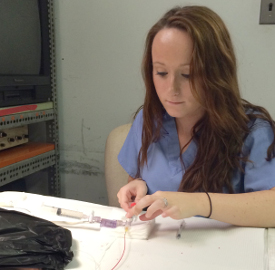JACKSON, Tenn. — May 12, 2015 — Courtney Berger, a senior biology major at Union University, spent the last two summers at University of Tennessee Health Science Center researching the effect of different drugs on blood flow to the brain of infants.
The neonatal pediatric research focused on discovering how to get enough blood or oxygen to the brains of premature babies.
“It’s very experimental at this point,” Berger said. “We operated on baby piglets and introduced different concentrations of drugs to the surface of their brains through the ports.”
Berger is the first Union University student to be involved in the undergraduate research program at University of Tennessee Health Science Center. Dr. Charles Leffler, the primary lead in the scientific community on this subject, served as Berger’s mentor at UT.
“I was blessed to have a phenomenal lab,” Berger said. “They invited me back. I might end up doing that this summer.”
The research allowed the undergraduate students hands-on experience. In her first year, Berger said she made the drugs, introduced them and wrote down the data. In her second year, she performed the surgery on her own several times.
“The motto of our lab was, ‘If everything goes right, you did something wrong,’” Berger said. “Nothing is ever perfect when it comes to live animals. For us to measure the blood flow of the brain, they had to be alive the whole time. It’s what you do as a doctor—making sure you are keeping your patients alive.”
After graduating in December, Berger plans to attend medical school and become a pediatrician. She said the research experience showed her the origin of all the medicines she will prescribe as a physician.
“The research I worked on will directly affect babies,” Berger said. “It will be cool to see if it becomes applicable in my lifetime. Even still, certain aspects of our research have already gone into clinical trials.”
Berger’s research resulted in a 56-page paper for her undergraduate project. The completed research under Leffler should be published in a medical journal in the coming year.
“As a researcher, you discover something,” Berger said. “It’s yours, but you want to share it with everybody. I loved the fact that we are eventually benefiting the lives of premature babies in the future. It’s ground level, but we are able to explore the possibilities.”

